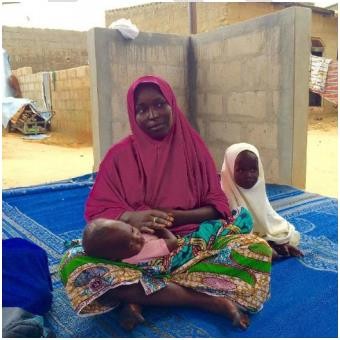- What We Do
- Agriculture and Food Security
- Democracy, Human Rights and Governance
- Economic Growth and Trade
- Education
- Ending Extreme Poverty
- Environment and Global Climate Change
- Gender Equality and Women's Empowerment
- Global Health
- Water and Sanitation
- Working in Crises and Conflict
- Disaster Assistance
- Political Transition Initiatives
- Conflict Mitigation and Prevention
- Countering Violent Extremism
- Disaster Risk Reduction
- Peacebuilding and Reconciliation
- Providing Safe & Secure Environments for Development
- Recovering From Crisis
- Resilience
- Tech Challenge for Atrocity Prevention
- World Humanitarian Day
- U.S. Global Development Lab

Moments before Aisha Suleiman’s village broke their fast one evening during Ramadan, Boko Haram militants attacked. Aisha, her children, and husband managed to flee, walking for days before finding transport to Maiduguri, the capital city of Borno State and a safe haven for 445,000 internally displaced persons. In Maiduguri, Aisha’s family began participating in a USAID-supported program that provides vulnerable, food-insecure households with cash transfers to purchase food in local markets.
Sadly, Aisha’s story is not unique. Boko Haram-related conflict has displaced more than 1.7 million people in northeastern Nigeria. Unable to farm or earn a living, an estimated 5.2 million people are projected to face severe food insecurity by mid-2017. Acute malnutrition is prevalent among children, and the risk of famine remains high, particularly in areas that are inaccessible to humanitarian organizations.
To address widespread food insecurity, USAID is supporting the UN World Food Program (WFP) to scale up operations and provide life-saving assistance in northeastern Nigeria. Since October 2016, WFP has significantly increased the number of people it reaches each month, from 200,000 to more than 1 million people in March 2017. WFP emergency assistance includes cash transfers and food vouchers where markets are functioning, as well as distributions of nutrition supplements and food commodities, such as cooking oil, rice, and legumes.
In response to alarming levels of acute malnutrition, USAID has integrated nutrition interventions into its emergency food assistance programs. Activities like the Porridge Mums mother-to-mother support group, in which Aisha and her two young children participate, support pregnant and lactating women to improve nutrition conditions by providing information on infant and young child feeding practices, hygiene and sanitation, and dietary diversity.
Donor resources have been critical to the successful scale up of emergency food and nutrition assistance in Nigeria. WFP plans to continue expanding relief activities in the coming months and aims to reach up to 1.8 million people by the lean season in mid-2017, when needs are most acute. Without further resources and support for food assistance operations, however, this scale up will not be able to continue when it is needed most







Comment
Make a general inquiry or suggest an improvement.